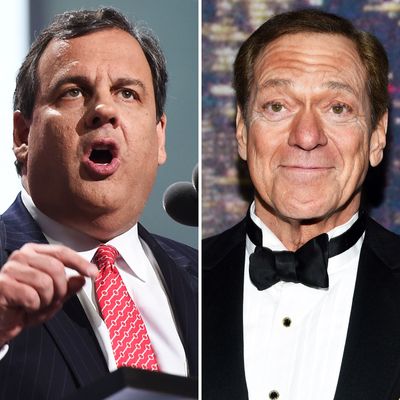
It would be an understatement, and not at all a comment on the New Jersey governor’s girth, to say that Chris Christie casts a large shadow over this year’s election to select his successor. For eight years he has dominated his state’s politics, first as a successful bipartisan “problem-solver” with a knack for making his opponents look bad, and then a scandal-plagued punching bag and early lame duck. Until just over a year ago, his ambitions for higher office obscured his steadily declining status back home, aside from the “Bridgegate” scandal that dogged his presidential campaign. But then his close association with Donald Trump defined his national profile, and when Trump surprisingly won, it was widely assumed Christie was headed to Washington in some capacity.
Now, after being passed over for the attorney general gig he supposedly craved, leading him to turn down less exalted posts, Christie looks likely to stick out the last year of his governorship. But he may have thoroughly worn out his welcome in New Jersey. His job approval ratio fell to an abysmal 17/78 in a Quinnipiac survey at the end of January. His own lieutenant governor and the most likely Republican to succeed him, Kim Guadagno, has been trying desperately to distance herself from her former mentor and political sponsor. Another competitive GOP candidate for governor, Assemblyman Jack Ciattarelli, hasn’t had to do that because he’s long fought Christie, and even called for his resignation for spending too much time outside the state.
For his part, Christie seems to be taking a less abrasive approach as he fills out his term, backing off on a controversial education-funding proposal. But the key question is whether he’s doomed Republicans to lose in November. They are already suffering from the handicap of being the party that controls the White House, occupied by a man who lost New Jersey in a 14-point landslide last November. It’s been 32 years since the presidential party won a gubernatorial election in New Jersey.
Perhaps unsurprisingly, some New Jersey Republicans are pining for a nonpolitician to run for governor this year. And they may get one in former Saturday Night Live comedian and current talk-show host Joe Piscopo, a former Democrat and more recently an independent, who nonetheless ran second to Guadagno in a poll of New Jersey Republicans. Piscopo was a Trump backer and is testing out a sort of conservative-populist platform:
Mr. Piscopo has formed the skeleton of a platform: a focus on increasing manufacturing for distressed communities; resuscitating the state’s once-booming pharmaceutical industry; a property tax cap; using public-private partnerships to rebuild the state’s infrastructure; eliminating the state income tax for teachers, firefighters and the police; and, with his show business roots, working to “make Atlantic City the film capital of the Northeast.”
Unlike Guadagno and Ciattarelli, who will probably have to rely heavily on New Jersey’s system of publicly financed matching funds for campaign contribution, Piscopo could probably raise a lot of money. That, too, is a big advantage since the likely Democratic nominee, former Goldman Sachs executive and Obama administration ambassador to Germany Phil Murphy, has money to burn. He’s already loaned his campaign 10 million smackers, and there’s more where that came from.
Murphy benefited from decisions by better-known Democratic pols to skip this race. But he could face a tenacious primary challenge from veteran assemblyman John Wisniewski, who played a central role in exposing the whole Bridgegate scandal. Of equal importance, perhaps, is the fact that Wisniewski was Bernie Sanders’s New Jersey campaign manager last year. He’s right out of central casting to take on Murphy, whose Goldman Sachs background not only has unsavory national implications, but will also remind Garden State voters of the less-than-popular governor Jon Corzine, the former Goldman exec Christie beat in 2009.
While a Murphy-Guadagno matchup remains the most likely scenario, a lot could happen between now and the June 6 primary, not to mention the November general election. For one thing, Christie could still wind up resigning for a Trump gig if the tempests surrounding his White House and cabinet continue to howl, giving Guadagno the dubious distinction of running as an incumbent. And state issues will also unpredictably pop up.
One wild card is whether anti-incumbent sentiment could affect Democrats as well as Republicans since the donkey party has controlled both chambers of the state legislature continuously since 2001. All New Jersey legislators will face the voters this year, and while Republican gains are possible, Democrats currently control the lower house by a 52-28 margin and the upper house 24-16. All in all, New Jersey is more likely than Virginia to play into a narrative of the president’s party losing ground in off-year elections as a prophecy of things to come in the midterms. You can thank Donald Trump for that, not to mention his buddy Chris Christie.






























